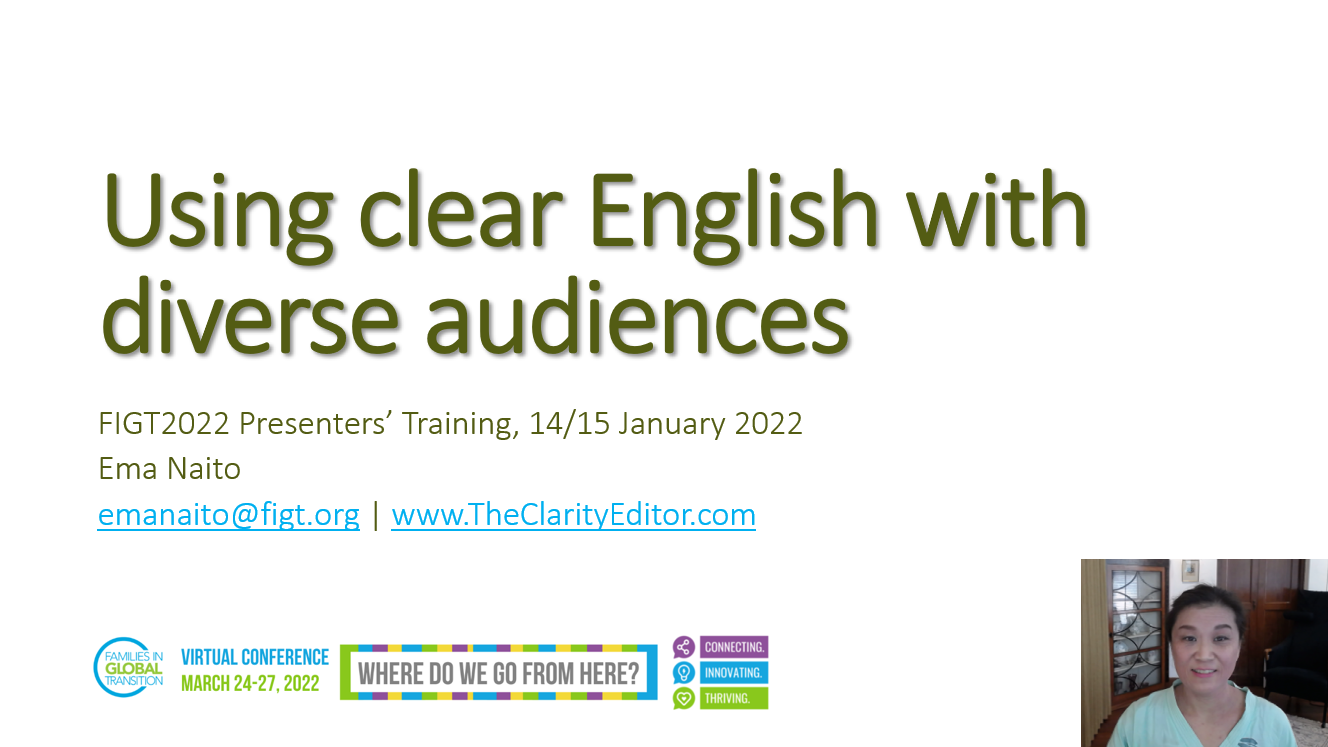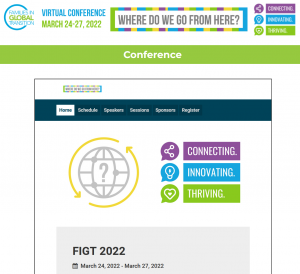
Need to present to a diverse, international audience? Here are some tips.
I was invited to brief the presenters for the Families in Global Transition 2022 conference in March as they started preparing their talks.
All presenters will be speaking but only a few will be writing (no slides!), so I had to focus on tips for speaking—a new twist for me. So here’s what I talked about.
Key tips for speaking
I thought back on many years of working with people in/from different countries with very different English-comfort levels and came up with these key tips:
1. Be aware of your word choice
Especially avoid slang, figures of speech, and cultural references—those can make people feel that they are not part of the conversation.
(Take a look at the image “A Figure of Speech” in the tweet below, in which artist Ella Baron draws 27 English figures of speech ⬇)
I received zero notice or severance pay- now would be an opportune time to notice a cartoon print shaped hole on your wall. If that is the case- please buy directly from me: https://t.co/xJ8iOXvYer 🙏 pic.twitter.com/DdMeXzI4Yn
— Ella Baron (@EBaronCartoons) September 18, 2020
Also avoid technical terms, jargon (“Special words or expressions used by a profession or group that are difficult for others to understand,” online Oxford English Dictionary), abbreviations. If you must use some, explain what the words mean. Try to give memorable, simple explanations—not the formal (technical/jargony) definitions.
2. Use short, “plain” words
This is, of course, a point I talk about often.
If you have the choice, use the shorter, more direct word. Avoid the longer, harder (supposedly “sophisticated”) words.
Short words can be understood quickly. Using them will help your readers immediately understand you.
One warning, though: phrasal verbs like “make sure,” “carry on,” and “take advantage of” may not be clear to someone less familiar with English. That’s because the root verb (“make”) has a different meaning from the phrasal verb (“make sure” = ensure).
| Instead of | Use |
|---|---|
| carry on | continue |
| speak to | discuss |
| take advantage of | exploit |
Sometimes, the less-plain word may be clearer.
3. Find the action: Save the verb!
I talk about this often too.
Often, we “smother” (hide) the action as nouns. But actions are more immediate and interesting. Rescue those verbs!
Here are some examples:
| From the “smothered” action… | …rescue the verb! |
|---|---|
| We provide a review of… | We review… |
| The group conducted an analysis of… | The group analyzed… |
| It presents a comparison of… | It compares… |
4. (Bonus point!) Speak slowly
I know I said “3 tips” but this one is a bonus. I’m sure it comes as no surprise but: speak slowly. This is a simple thing, but important.
Speaking slowly is tough for me. I always need to practice my talks just so I can slow down.
And don’t fear pauses. It gives your audience a chance to process what you said.
You can read a fuller account of these speaking tips on the FIGT blog.
Tips for writing
I shared a few more tips specific to writing, with presentation slides and posters in mind:
- Stick to one key message per slide, per sentence. Use short sentences.
- Say WHO is doing WHAT.
- Keep the WHO and WHAT close to each other.
- Consider readability and accessibility.
You can read about these in another post on the FIGT blog. (I’m preparing some posts for this blog too.)
Feedback
I was pleasantly surprised with the positive feedback I got from this 12-minute talk, including kind words from Ruth Van Reken and Michael Pollock, co-authors of Third Culture Kids: Growing Up Among Worlds (revised edition)!
The FIGT Research and Education Director also said she noticed the presentations being prepared by researchers are noticeably simpler, more accessible to the layperson this year. Hooray! 😀
Bringing the globally mobile together: FIGT2022
Wondering what conference I’m talking about?
FIGT2022 (25-27 March) will bring together people with experiences of global mobility, to reflect on how the changes of the last two year have affected those of us with ties around the world.
I’ll be hosting a “kitchen table conversation”—a space for short, casual talks among participants—on connecting through the written word.
Last year, I did my first lightning talk (at the Chartered Institute of Editing and Proofreading 2021 conference). This will be my first time hosting/presenting at a conference. Exciting!
Find out more about FIGT2022 and register 🙂
References
My two blog write-ups for FIGT on English with diverse audiences:
If you would like to discuss whether we might be a good fit for your non-fiction scholarly writing project, please send me details via the contact form or email me at info@theclarityeditor.com.


